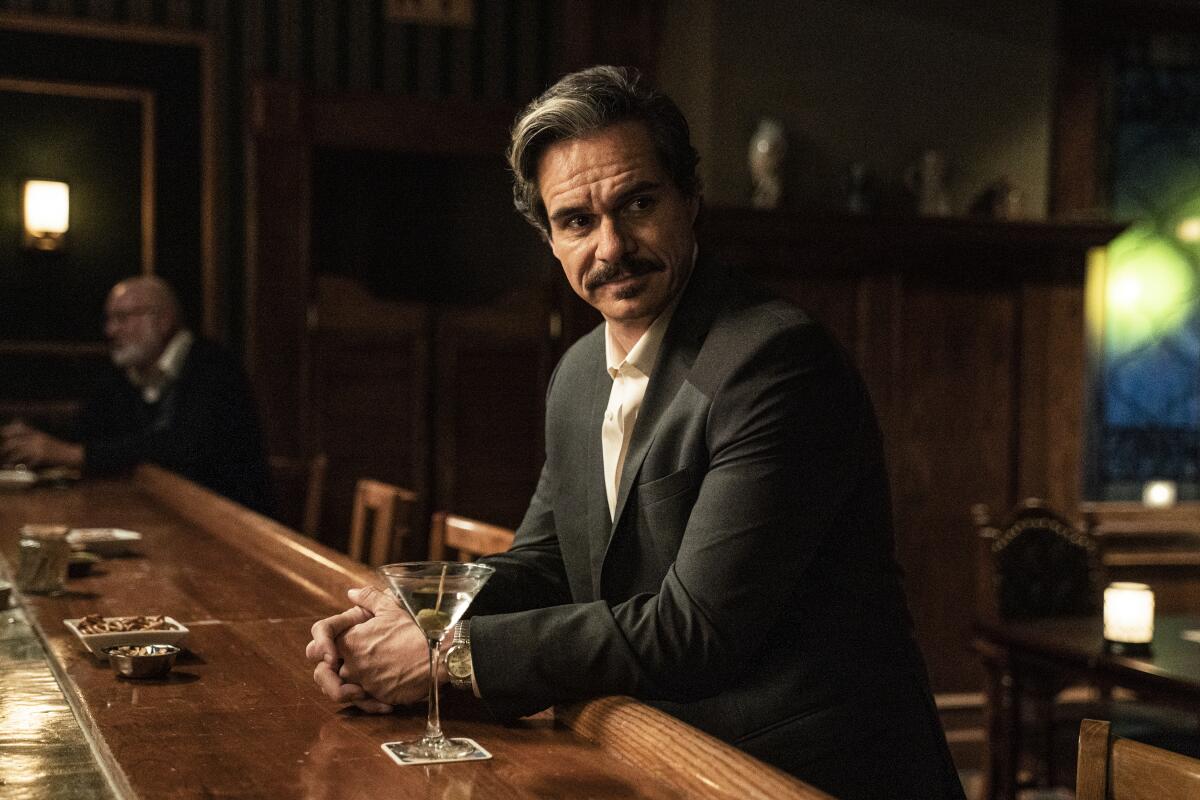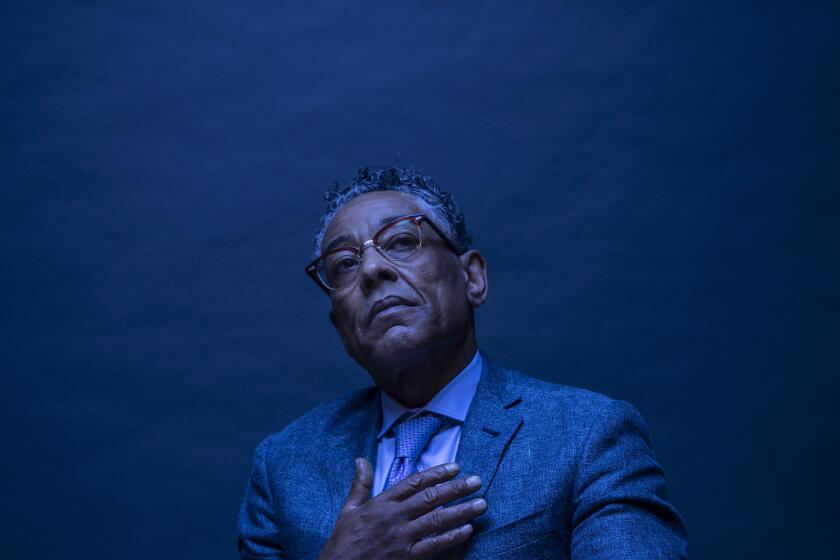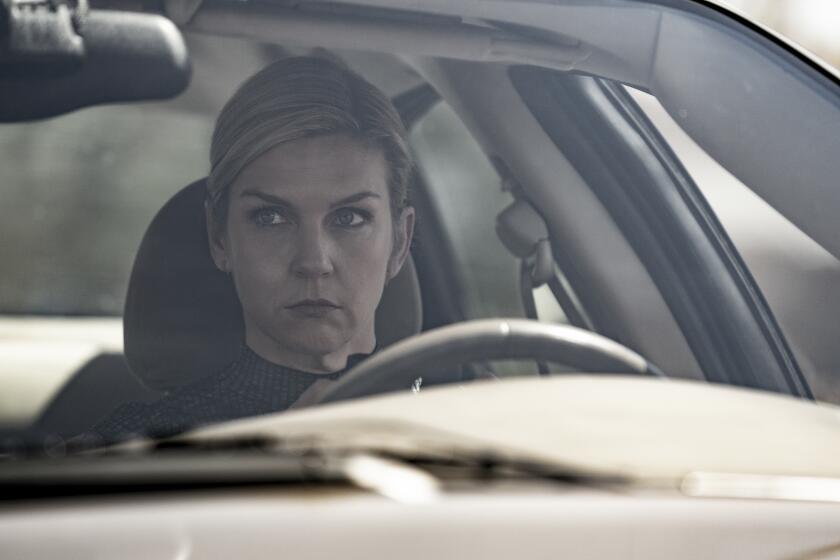How Tony Dalton made himself, and his character, indispensable to ‘Better Call Saul’

- Share via
The first time Lalo Salamanca appears on “Better Call Saul,” he is dancing and cooking, amusing himself and oozing (menacing) charm as he coaxes cartel enforcer Nacho Varga (Michael Mando) into tasting his concoction.
But devoted fans already knew that Lalo was no Mr. Nice Guy: his name is first mentioned in “Breaking Bad” when Saul is whimpering on his knees at gunpoint in front of a freshly dug grave, claiming, “It wasn’t me, it was Ignacio…” before saying, with some relief, “Lalo didn’t send you?”
The last time we saw Lalo, in the first half of “Better Call Saul’s” bifurcated final season, he brought terror and death into the home of Jimmy McGill/Saul Goodman (Bob Odenkirk) and Kim Wexler (Rhea Seehorn), starting his consultation with his lawyers by calmly blowing out Howard Hamlin’s (Patrick Fabian) brains. It was a savage punctuation mark on the midseason finale and raised plenty of questions (and audience members’ blood pressure) as the series heads toward the finish line.
In less than two full seasons, Tony Dalton, 47, has made Lalo into one of television’s most memorable characters — no easy feat in a show that was already stocked with them. Dalton credits the writers’ adaptability: When Lalo was first introduced, co-creator Vince Gilligan said that his nemesis, Gus Fring (Giancarlo Esposito), was playing chess while Lalo was playing checkers, but Dalton says, “the writers realized Lalo is actually quite the chess player.”
For Dalton, a Mexican American from Texas who studied in New York at the Lee Strasberg Institute, this character was a long-awaited opportunity. In Hollywood terms he was too Mexican for American parts and too American for many Mexican ones. Unable to find good roles early in his career, Dalton wrote and starred in two Spanish-language films in Mexico, “Matando Cabos” and “Sultanes del Sur.” More recently he spent five years in the title role as a somber hit man turned crime boss on the Mexican series “Sr. Ávila.”
He recently spoke to The Times about who he thinks Lalo really is, what it’s like being the new guy on an established series and why he changed the recipe of that dish he was cooking in his first day on set. This interview has been edited for length and clarity.
The actor waited 10 years to make his TV directorial debut. He spoke to the Times about getting the call and key creative choices in ‘Axe and Grind.’
Writing your own screenplays to get good parts shows smarts, ambition and a creative persistence…
Don’t forget desperation and poverty. Those are important factors. Probably the first ones.
Do those traits make you a less murderous version of Lalo?
I think his story is completely different. I don’t know for sure because the writers don’t tell me anything, but I thought, “Maybe this guy speaks English perfectly, maybe he grew up in the States and went to school here,” which a lot of people do if their parents are wealthy. So I figured he had an easy life.
Lalo is a little prince. He had it all handed to him. It’s just that they went too far with him and brought out the psycho under the nice rich guy.
I sure as hell did not have it easy. I picked this career and didn’t know what else to do. I’d been waiting tables and that was not something I wanted to do for the rest of my life. It’s not like at 25 I could just go into engineering.
I had to write myself those movies to get my foot in the door. I read the first part of “Good Will Hunting” and how Matt Damon and Ben Affleck wrote that movie and thought, “I can do this.” [Laughs wryly.]
Casting directors here couldn’t figure out what to do with you 20 years ago. Do you think it would be easier now if you were starting out?
I’d like to believe it, but unfortunately I think it’s exactly the same. I think some people take chances like they do in the “Better Call Saul” world. But even now people don’t want to offer me an American part because they think I’m not American — which I am, by the way — and then I get offered the Mexican drug guy. I got offered a Mexican drug lord part for an American show the other day. It takes time to break out of a cliche.
Did you have a sense of Lalo’s arc when you started?
I had no idea. To begin with I was offered just those last episodes in Season 4 in a supporting role. I realized it was that Lalo from “Breaking Bad” so I figured I’d have a couple of episodes to set up the “It wasn’t me, it was Ignacio” scene. Then I started reading it and saw this guy is going to stay here and create some havoc.
Your take on Lalo is so different from Sr. Ávila and also in stark contrast to Gus Fring. Where did this interpretation come from and how much did you discuss it with co-creators Peter Gould and Vince Gilligan?
We didn’t discuss it at all, I just showed up on the set. The writing is impeccable so the characters are very clear. They don’t write a lot about how the character should be, it’s just a couple of sentences and you get it.
I think it’s very important you take risks, especially the first day, and so I kind of went for it. They said, “This guy has even more than what we’ve written.” So they started putting more of that into the script and we joined together with our ideas. The character became much bigger than I had expected and than they had expected as well.
I wanted to play a part that was not so serious and stoic. I’d been offered stuff that was so serious, so when this came around I thought this was a perfect chance to show a different face, especially after five years of Sr. Ávila. People get stuck thinking you’re that guy.
Series co-creator Peter Gould, star Rhea Seehorn and co-writer Thomas Schnauz break down the shocking final moments of the Season 6 premiere.
Now everybody thinks you’re Lalo.
Exactly. But that’s not bad because it means I changed everybody’s perceptions. And the next guy I play they’ll think I’m him. I can have a whole career where they don’t know who you are.
Many shows with white writing staffs, including “Breaking Bad” and to a lesser extent “Better Call Saul,” have been criticized for seeming to use Google Translate to write the scenes in Spanish. How involved did you get in trying to add more realism and accuracy?
I definitely did get involved, with a very humble hat-in-your-hand way. I would say, “I know what you mean, but it doesn’t translate this way. Maybe if you say this, which is more slangy, it would work better. I’ll say it your way if you want me to… but… my suggestion is that this little line could change things.”
It was worth it because I would feel uncomfortable otherwise saying things no Mexican would say.
The first day I was on the set I’m cooking and I offer Nacho some food and the line was, “I made them for you, I put cilantro in them.” I didn’t want to be that new actor thinking he’s all that so I said, “I’ll say cilantro but it’s not a big deal to put cilantro in his food, that’s just normal, but there’s really cool stuff in Mexico, there’s a spice called epazote that’s strong,” and they said, “Okay, let’s do it.”
I’d thought this out before I got there, it’s not like I just came up with it.
Were you nervous at all coming into a cast of an established show where they all had such great chemistry?
In that situation, I’ve learned to always be nice. It’s their show, they’ve carried it on their shoulders to get it to where it is. So learn your stuff, show up, say hi to everybody. That’s what I did. It’s not that I was nervous. It was fun. They’re such great actors and so professional.
Given the writers’ and audience’s fascination with Lalo, you must feel like you’re not the outsider, the new guy, anymore.
I still do. It’s “Hey guys, don’t mean to bother you, just coming to do a scene with you.” This is the first thing I’ve really done in the United States so you don’t want to lose perspective or get cocky and think it’s your show. It’s not.
That could be the next spinoff.
“Better Call Lalo.” [Laughs] That one will be my show.
More to Read
The complete guide to home viewing
Get Screen Gab for everything about the TV shows and streaming movies everyone’s talking about.
You may occasionally receive promotional content from the Los Angeles Times.








